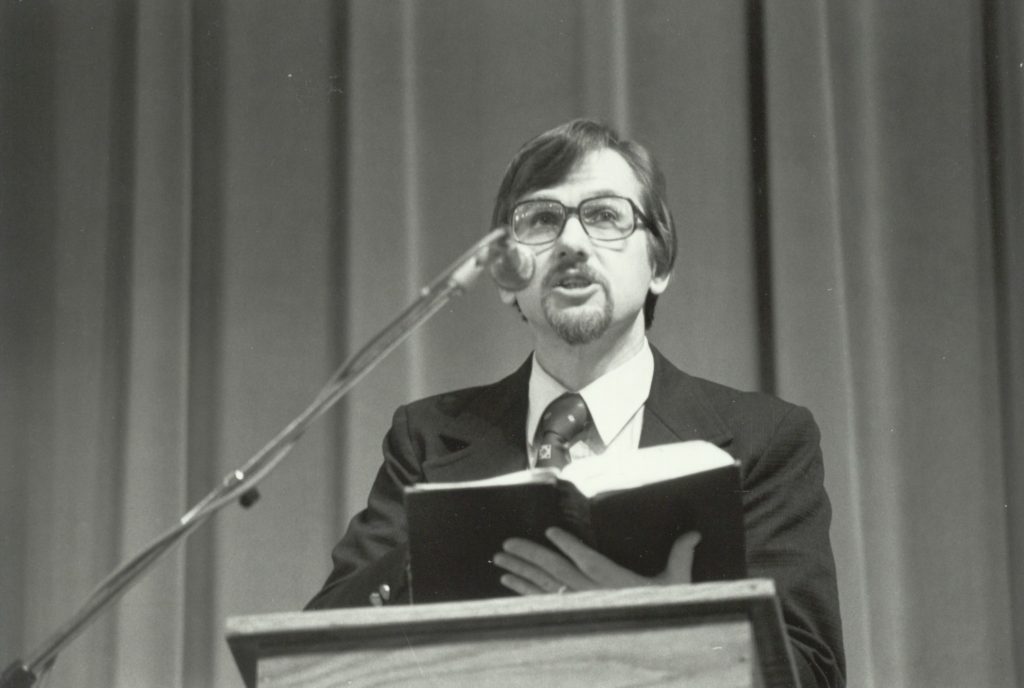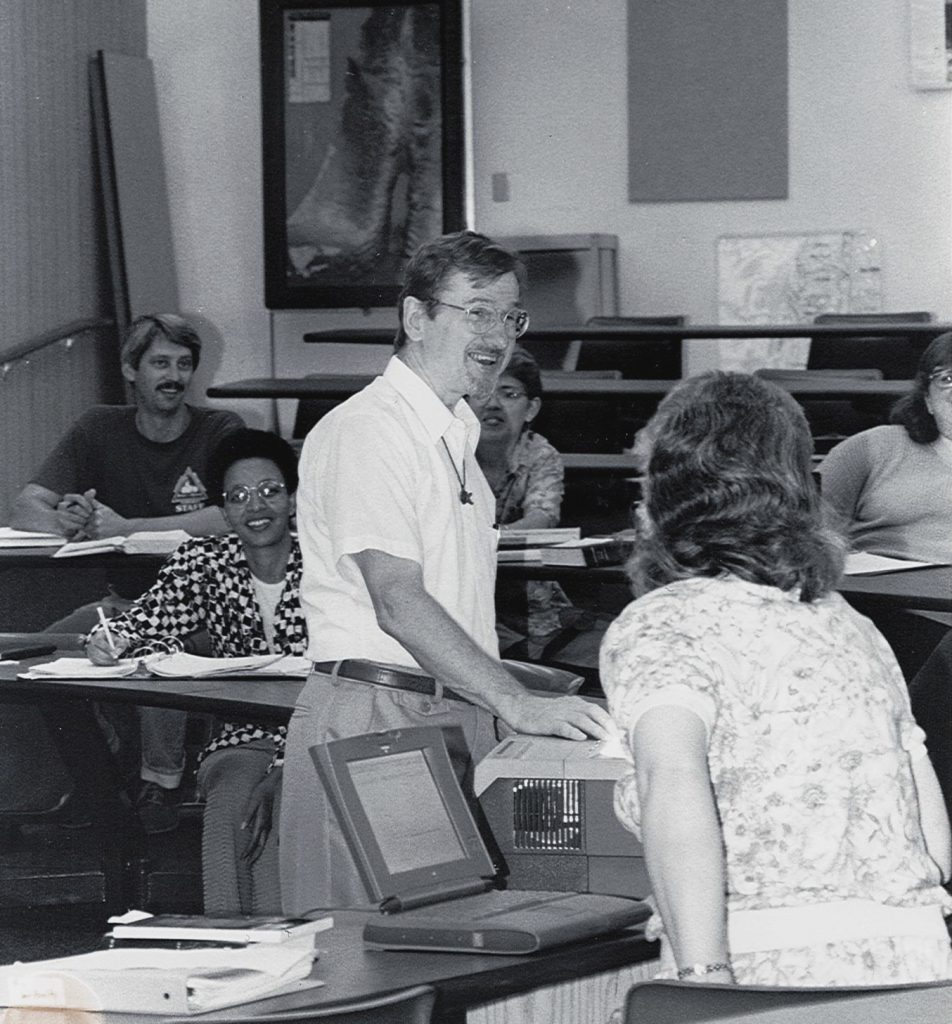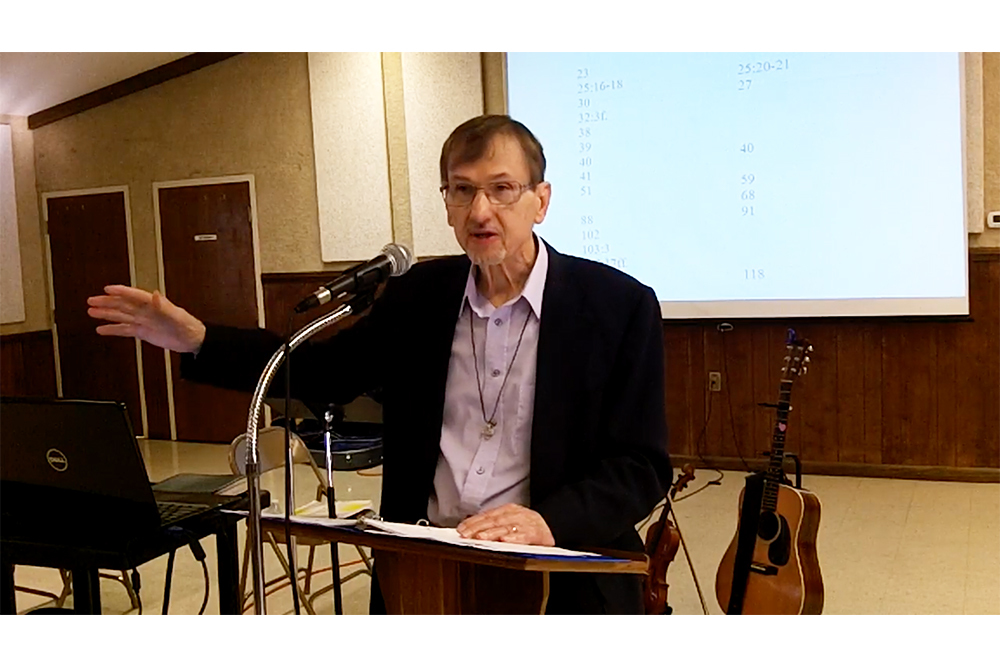Willard M. Swartley ‘59, PhD., former professor and dean at Eastern Mennonite College and Seminary and professor emeritus of New Testament at Anabaptist Mennonite Biblical Seminary, died of natural causes at age 83 on Nov. 6, 2019, in Goshen, Indiana. He had lived with a heart condition for many years.
Swartley was professor of New Testament at Eastern Mennonite College from 1971–78, where he also served as dean 1976–78. He was EMU’s Alumnus of the Year in 2004.

Swartley earned a Ph.D. in New Testament Studies from Princeton (New Jersey) Theological Seminary in 1973; a Bachelor of Divinity from Goshen (Indiana) Biblical Seminary (now AMBS) in 1962; and a Bachelor of Arts from Eastern Mennonite College (now University) in Harrisonburg, Virginia, in 1959. He spent various summers studying at universities in Tübingen, Heidelberg and Göttingen, Germany; Union Theological Seminary, New York; and Garrett-Evangelical Theological Seminary, Evanston, Illinois; among others. He also was a senior scholar at the University of St. Andrews, United Kingdom (2002), and a research fellow at Cambridge (United Kingdom) University (2002) and Yale Divinity School, New Haven, Connecticut (1988–89).
Among his many published works are the books Jesus, Deliver Us: Evil, Exorcism and Exousiai (Cascade, 2019); Living Gift: John’s Gospel in Meditation and Poetry, Art and Song (Evangel, 2013); John (Believers Church Bible Commentary; Herald, 2013); Health, Healing and the Church’s Mission: Biblical Perspectives and Moral Priorities (InterVarsity, 2012); Send Forth Your Light: A Vision for Peace and Mission, and Worship (Herald, 2007); Covenant of Peace: The Missing Peace in New Testament Theology and Ethics (Eerdmans, 2006); Homosexuality: Biblical Interpretation and Moral Discernment (Herald, 2003); Israel’s Scripture Traditions and the Synoptic Gospels: Story Shaping Story (Hendrickson, 1994); Slavery, Sabbath, War and Women: Case Issues in Biblical Interpretation (Herald, 1983); and Mark: The Way for All Nations (Herald, 1979; rev. ed. 1981).

Swartley was also the New Testament editor for the Believers Church Bible Commentary series (Herald) and editor of 20 other books, including Politics of Discipleship and Discipleship in Politics: Jürgen Moltmann Lectures in Dialogue with Mennonite Scholars (Cascade, 2006); The Love of Enemy and Nonretaliation in the New Testament (Westminster/John Knox, 1992); and Perspectives on Feminist Hermeneutics (IMS, 1987), with co-editor Gayle Gerber Koontz, Ph.D., professor emerita of theology and ethics.
He also taught at Conrad Grebel College (now University College) in Waterloo, Ontario, and Goshen (Indiana) College, as well as seminars and intensive courses in Japan, Taiwan, Swaziland, Nairobi, Botswana and Cairo.
Swartley was baptized in 1945 at Doylestown (Pennsylvania) Mennonite Church and, while still in seminary, became pastor and was ordained at the former Locust Grove Mennonite Church in Elkhart. From 1978 to his death, he was a member of Belmont Mennonite Church in Elkhart, where he served on numerous commissions and teams.
He was born Aug. 6, 1936, in Doylestown, Pennsylvania, to William Henry Swartley and Ida Myers Swartley, as the youngest of eight children. He is survived by his wife of 61 years, Mary, of Goshen; their two children, Louisa Renee Swartley Oyer (Gary Oyer) of Hesston, Kansas, and Kenton Eugene Swartley (Emily Hertzler Swartley) of Cedar Falls, Iowa; six grandchildren; and a sister, Dorothy Swartley Martens of Chester, Vermont.
Burial and the memorial service were Saturday, Nov. 9. Memorial contributions may be made to AMBS or a charity of your choice. Online condolences may be shared at www.yoderculpfuneralhome.com
Parts of this article were contributed by and published with permission from Annette Brill Bergstresser/AMBS.

Willard Swartley was one of best professors I ever had, and he sparked my lifelong interest in New Testament studies. That was at EMU 1966-67, but I don’t see those years of service at EMU mentioned in any of the tributes or obituaries.
Yes, I also was in his “Synoptic Gospels Class” summer of 1967. Dr. Swartely ignited a new understanding of the New Testament for a young, conservative, country girl!
What a treasure to the church. Willard’s recruitment letter offering to teach me to read the New Testament in Greek sealed the deal to get me to EMC for a Bible degree. He exposed me to rigorous Biblical scholarship and challenged many of my assumptions but also shared a life of deep commitment to following the way of Jesus. I am honored to have been able to study with him.
I, too, recall being in his “Basic Bible” course during 1966-67. “Basic” it was not — he was incredibly detailed. I think we outlined, in flow chart form, the entire book of Mark as one assignment! Even from that early date he was a scholar and inspired all of us to dig deeper.
A giant has left us, a gentle giant to be sure, but a giant nevertheless. I missed Willard in the classroom, both here at EMC (where I did my BA) and also at AMBS (where I did my MDiv). But I have been deeply enriched by Willard’s personal friendship, his prolific scholarship, and above all his gift and passion for nurturing “younger scholars” along the way throughout his career.
My first contact with Willard’s teaching was at the Mennonite Church General Assembly at Estes Park, CO, in 1977, where Willard presented a remarkable set of Bible studies on the Gospel of Mark , accompanied by a riveting series of dramatic sketches performed by an EMC drama troupe. When I started attending the Annual Meetings of the Society of Biblical Literature, I was able to engage with Mennonite scholars from all over the US and Canada, thanks to the annual gathering of “Mennonite Scholars and Friends” started up by Willard years before. And over the years Willard has been a warm, gracious, and hugely supportive New Testament mentor and colleague of mine, mostly at a distance but in very tangible ways: carrying on engaged New Testament discussions as opportunity permitted, inviting a manuscript from me for an upcoming publication, recommending book proposals of mine to publishers, and requesting my response to the in-process manuscript of his latest publication, “Jesus, Deliver Us: Evil, Exorcism, and Exousiai. Little more than a month ago I sat with Willard at the Haverim Breakfast at EMU Homecoming and discussed New Testament interests, his latest book and my latest essay. I had no idea this would be our last conversation . . . .
Thank you, Willard, for your love for the Scriptures, your long years of opening them to countless students and others throughout the church, your passion and enthusiasm for supporting “younger scholars” along the way, and all those books that you have left behind as a witness to your faith and your scholarship. You have blessed us richly. And we will miss you.
Yes, I also was in his “Synoptic Gospels Class” summer of 1967. Dr. Swartely, gently with vigor!, ignited a new understanding of the New Testament for a young, conservative, country girl! Later his class on “The Inductive Method of Bible Study” inspired me to dig deeper in the years ahead.
These classes were at then EMC, 1967 to 1969. More recently, Dr. Swartely taught a class in my Lancaster County home area thru “Keystone Bible Institute”, held at then Lancaster Conference, Weaverland Mennonite Church.
I had suggested Dr. Swartely as a contributor each year for several years. A leader of the Keystobe Bible Institute informed me Dr. Swartely is a bit too liberal for this area. Somehow he received and accepted the invitation to present his rich teaching in Lancaster County, PA in the mid seventies. I never heard of any problems arising, but I do recall there was little discussion in that class.